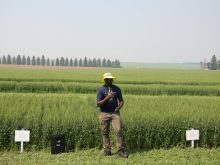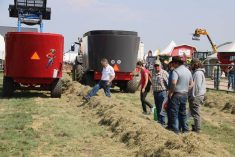WINNIPEG — Eight years ago, Sally Flis was working for the Fertilizer Institute in Washington, D.C.
She was the director of agronomy and worked on grower adoption of 4R nutrient stewardship, which is right rate, right time, right place and right source when applying fertilizer.
Related story: Corporate fertilizer plan pushes sustainability
Read Also

Alberta eases water access for riparian restoration
Alberta government removes requirement for temporary diversion licence to water plants up to 100 cubic metres per day for smaller riparian restoration projects
Then, Donald Trump was elected president and Flis’s husband assumed the worst.
“My husband freaked out. (He said), ‘you’re not going to have a job anymore. Trump is president. Nobody is going to care about the environment anymore,” Flis said, while sitting on a chair inside the Nutrien Ag Solutions booth at the Ag In Motion farm show, which was held in July near Langham, Sask.
Flis, who is now the director of sustainability program design and outcome management with Nutrien Ag Solutions, said her husband’s panic didn’t match the reality.
Yes, politics do matter for sustainability and programs related to agriculture.
But other factors are just as important or more important.
“There is a lot of government policy in this … (but) corporate sustainability goals are not tied to government policy,” said Flis, who clarified that she was sharing her personal opinion and not speaking on behalf of Nutrien Ag Solutions.
“They (corporate sustainability programs) are tied to consumer pressure and investor pressure.”
Put another way, corporations such as Nutrien respond to market expectations.
The food industry has decided that its supply chains must be more sustainable, and Nutrien must deliver on that expectation.
“It’s value to them (food manufacturers),” Flis said.
“They want to put on a bag of chips, or a bottle of soda, that they’re doing things more sustainably than their competition.”
Despite the change from Barack Obama to Trump as president in 2017, sustainability efforts within agriculture and agri-food didn’t go away. That pattern will likely repeat if Trump is re-elected or the Conservatives win the federal election in Canada in 2025.
“I don’t see either administration change, in Canada and the U.S., changing that corporate outlook,” said Flis, who is from Buffalo, N.Y.
Tyler McCann, managing director of the Canadian Agri-Food Policy Institute, agreed that the value chain — from crop input companies to food manufacturers — are driving the shift toward more sustainable practices in agriculture.
”We see the (government) policy world playing more of a facilitating and enabling role (in countries like Australia and America),” he said.
In Canada, though, the current government took a lead role around sustainability.
“Policy got out front and the Government of Canada, going back to the fertilizer (emissions) target, really got the flag ahead of everyone else,” McCann said from his office in Ottawa.
“There are several things that have happened over the last couple of years where I think the government took too much of a leadership position (and) did it in a way that effectively antagonized the (agriculture) sector.”
One example is the federal funding requirements for agriculture research, in which 30 percent of research dollars in Agri-Science Cluster programs must be spent on greenhouse gas mitigation and other environmental goals.
Multiple commodity groups and farm organizations have been critical of that policy, saying it takes money away from other research priorities in agriculture.
“I think (that) was done pretty poorly,” McCann said.
Nonetheless, McCann has noticed a recent shift in the federal government and its approach to ag sustainability.
Instead of being the lead dog, the feds are now working in tandem with ag sector leaders.
“We’ve seen a bit of a backing off…. The government has been … trying to be more supportive. I think we’re getting closer to being more aligned to what’s happening in the other countries,” he said.
“If you look at the approach they are trying to take with the sustainable agriculture strategy, they’re trying to do that collaboratively.”
If the Conservatives do take power after the next federal election, different policies around agriculture and sustainability seem likely.
However, a 180 degree shift, where they completely abandon sustainability, seems unlikely.
Corporate goals and language such as “resiliency,” “stewardship” and a “journey towards sustainability” are now entrenched within the agriculture and agri-food industry.
As well, consumers and corporate investors will continue to pressure the food industry on greenhouse gas emissions, habitat preservation and fewer pesticides.
“I don’t see that consumer preference for more sustainable food going away,” McCann said.
“That front line piece around what companies and value chains are expecting (around sustainability) isn’t going to change. This isn’t going to go away.”


















